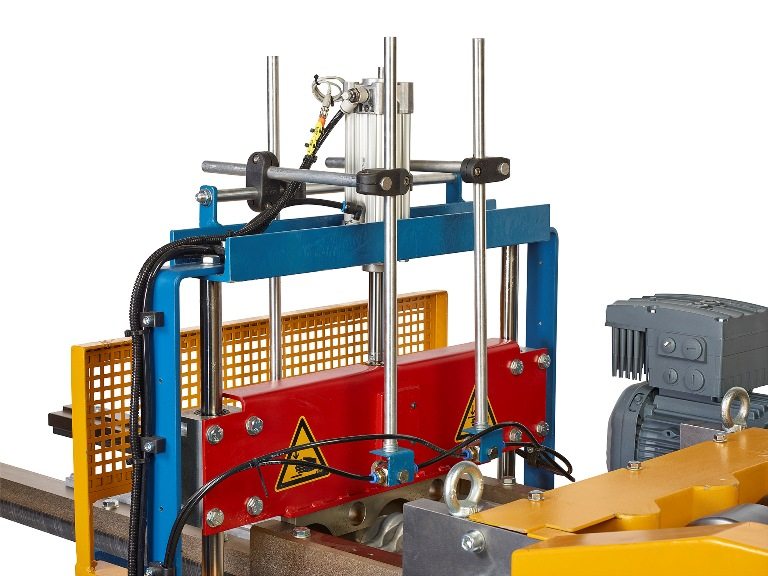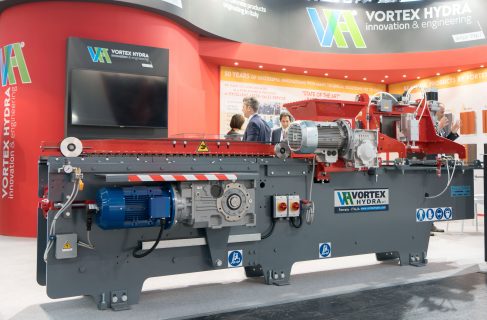A range of concrete roof tile machines developed specifically for start-up businesses and climatic and operating conditions in Africa is available from Pan Mixers South Africa (PMSA). These machines also take advantage of the fact that concrete roof tiles are a far more environmentally-friendly product than clay roof tiles.
Independent research from the Öko-Institut Freiburg (Ecological Institute) in Germany places concrete roof tiles well ahead of clay roof tiles in the categories of greenhouse effect, acidification potential, eutrophication, photo-oxidation and fine dust.
“The emphasis on infrastructure development in Africa, particularly in terms of government-funded projects, means that we foresee tremendous growth opportunities here,” ABECE Area Manager Fredrik Toftemo comments.
PMSA is the largest supplier of concrete brick, block and paving manufacturing machinery and technology on the continent. It recently displayed ABECE equipment at its stand at Totally Concrete 2015 at the Sandton Convention Centre in Johannesburg in mid-May. “Long-term strategic partnerships such as the one we have established with ABECE allows us to stay ahead of market trends.
“It also gives us the added flexibility to able to respond proactively to specific customer requirements, as well as providing robust and user-friendly equipment that can withstand the harsh operating conditions in Africa,” Booysen emphasises.
The SPS semi-automatic extruder can manufacture up to 5 000 concrete tiles in a nine-hour shift, depending on the specific plant configuration.This equates to about ten tiles a minute. The main benefits of this extruder are that it is easy to install, operate and maintain, which are important considerations in remote project sites in Africa.
The SPS extruder features a heavy-duty design that incorporates high-quality material and components in its manufacture. It has a 1.5kW motor power roller and a 5.5kW hydraulic power pack for the pusher movement. A standalone depalleter is also available, as well as ridge and trim tile manufacturing equipment.
Toftemo explains that concrete is fed from a conveyor into the concrete hopper above the slipper and roller unit. Aluminium pallets are placed manually on the support rails that guide the pallets through the extruder. A hydraulic cylinder pushes the pallets through the release oil spray system and the making head in order to shape the concrete tile.
Thereafter the automatic knife unit cuts and shapes the tile. This knife unit is kept clean by a water-spray system. The manufacturing process only requires three to five labourers, depending on the level of automation and the skills level of the staff. “Combined with the fact that concrete roof tiles are such an eco-friendly product, the SPS extruder is the ideal machine for African conditions,” Booysen concludes.
Factors to consider when selecting a concrete roof tile machine
Vortex Hydra, located in Northern Italy, Emilia-Romagna province (not far from Bologna, in the industrial heart of Italy), is the largest supplier of Concrete Roof Tiles production plants. The company has a wide variety of production plants, UNO line starting from 1,000 up to 12,000 tiles per shift (perfect for African start-up companies), and MODULO, ROTARY and MATRIX lines from 24,000 up to 60,000 tiles per shift.
With its 50 years of company history, Vortex Hydra has supplied more than 100 plants on the African continent. In company ongoing effort to penetrate and support African market, Vortex Hydra started collaborating with Hydraform international based in Johannesburg, South Africa. Hydraform is a leading supplier of the Hydraform interlocking building technology and manufacturer of Hydraform machines and equipment.
The concept machines according to Alessandro Chiarion, Vortex Hydra’s Sales Area Manager for Africa is to simplify as much as possible the interface between machines and the person. This goes hand in hand with training whereby operators with basic skills will be able to operate the roof tile machines. We are able to offer training and support throughout Africa.
“We suggest that one to starts with basic equipment and increase production and automation gradually, in this way a customer will approach new challenges step by step,” notes Alessandro.
The new UNO 30C was recently presented at BAUMA Munich, the world wide most important exhibition for equipment to produce building materials where Vortex was the only concrete roof tile machine manufacturer present. This plant permits to enter in the market with the relevant production of 1,200 square meters per shift and it is on the top of the podium of UNO line.
With customers present all over the world, Vortex Hydra’s always developing new systems for producing, curing and automatically packaging concrete roof tiles and new challenges are faced every year for the satisfaction of the numerous Vortex customer’s in the African continent and worldwide.


“Independent research from the Öko-Institut Freiburg (Ecological Institute) in Germany places concrete roof tiles well ahead of clay roof tiles in the categories of greenhouse effect, acidification potential, eutrophication, photo-oxidation and fine dust.” Can you please point to the exact research the Oko-institut did in regards to this quote, I would like to learn more, thank you!